Understanding Memorial Day Substance Use Risks
Memorial Day weekend is a time of remembrance and celebration, marking the unofficial start of summer. Unfortunately, these festivities also herald increased risks associated with substance use, primarily involving alcohol and drugs. This article explores the alarming statistics, safety concerns, and ways to prevent substance abuse during Memorial Day, focusing on the impact on young individuals, veterans, and those in recovery.
Increased Risks of Substance Use During Memorial Day
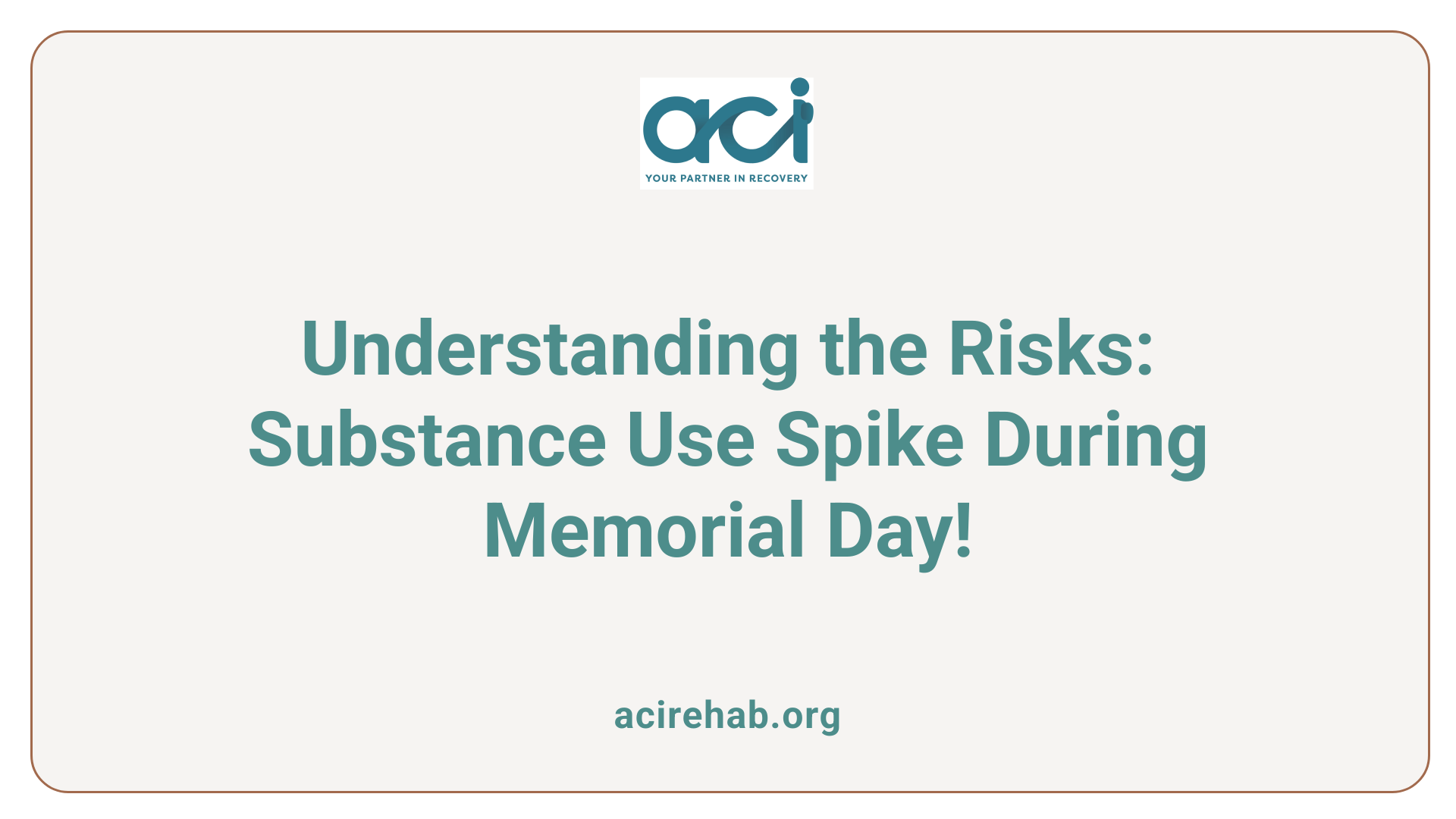
What are the increased risks of substance use during Memorial Day?
During Memorial Day, social gatherings and the associated party atmosphere can lead to a spike in substance use, especially alcohol consumption. Research indicates that underage drinking-related hospital emergency department visits increase by 11% during this time, and when alcohol is combined with other drugs, the rate of emergency visits for individuals under 21 rises sharply by 27% compared to regular days.
The festive environment may tempt young adults and teens to engage in binge drinking, a behavior linked to significant health risks. For instance, drinking alcohol impairs judgment and increases the likelihood of dangerous situations, such as driving under the influence. Statistics show that during the 2019 Memorial Day weekend alone, drunk driving resulted in 172 fatalities, highlighting the urgent need to address these risks.
Moreover, the social aspects of Memorial Day can lead to increased peer pressure to partake in substance use. This is particularly concerning for teenagers as nearly 70% of high school students have tried alcohol by graduation, often influenced by their peers. Furthermore, communal social setups may encourage the sharing of illicit substance paraphernalia, raising the risk of infections like HIV and hepatitis C among users, especially if drugs are misused.
The combination of festivities, lax supervision, and the normalization of substance use during these gatherings creates a precarious environment for individuals and is exacerbated by the illegality of underage drinking. As we celebrate, it’s crucial to recognize these heightened risks and address them through prevention strategies and open discussions among families about the implications of substance use.
Alarmingly High Statistics of Substance Abuse on Memorial Day Weekend
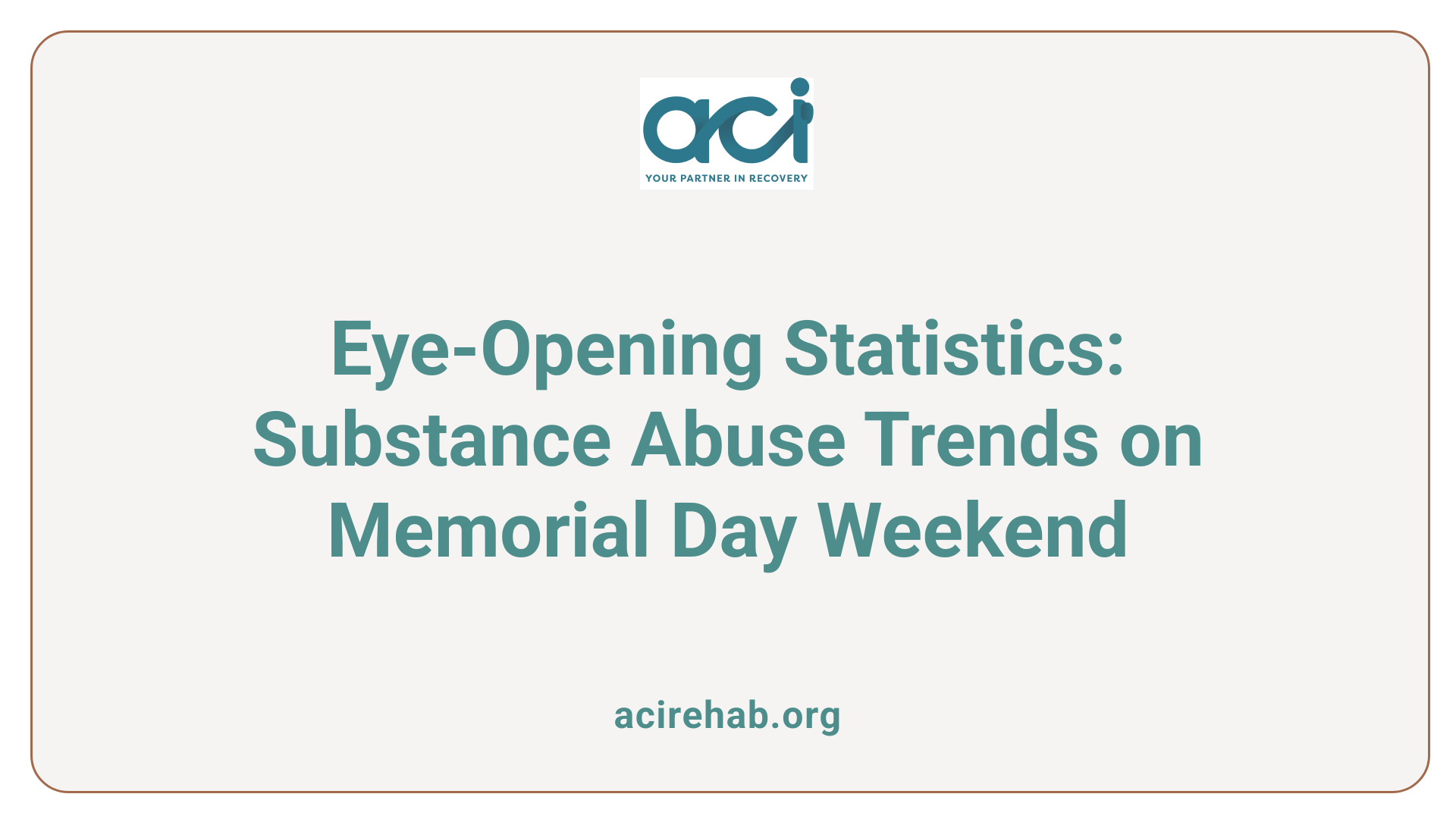
What statistics highlight substance abuse during Memorial Day celebrations?
Memorial Day is known for barbecues, parties, and the unofficial start of summer, but it also serves as a high-risk period for substance abuse. A significant 11 percent increase in underage drinking-related hospital emergency department visits occurs during this weekend compared to an average day. Alarmingly, visits involving individuals under 21 using alcohol with other drugs are 27 percent higher (199 visits versus 156 visits).
The statistics paint a troubling picture of fatalities and injuries:
- Emergency Room Visits: Over Memorial Day weekend, emergency room visits for alcohol-related incidents soar, emphasizing the urgent need for awareness. In 2019, 172 deaths from drunk driving were reported, making up 37% of traffic deaths that weekend.
- Alcohol-Related Deaths: Each year, around 5,000 people die due to alcohol-related injuries connected to underage drinking, underscoring the public health risk this behavior presents during holidays.
Underage drinking incidents
The challenge of underage drinking is compounded during holiday gatherings. Statistics reveal that 50% of teenagers have tried alcohol by age 15, and nearly 70% by high school graduation. Furthermore, those who begin drinking before age 13 face a staggering 45% chance of developing alcohol dependency. This connection to underage drinking incidents extends beyond personal health; it is linked to serious societal consequences, including an estimated 1,844 homicides and over 1.8 million property crimes annually, showcasing the broader impact of this issue.
Traffic accidents
Tying in with these alarming trends are traffic accidents. The days from Memorial Day to Labor Day, dubbed ‘The 100 Deadliest Days’, see a peak in fatalities among youth drivers, primarily due to intoxicated or impaired driving. In fact, traffic fatalities increase by approximately 11 percent during Memorial Day weekend alone, largely attributable to substance misuse. The consequences of alcohol consumption, particularly during celebrations, can lead individuals to engage in risky behaviors such as drunk driving or swimming, creating a lethal combination.
Encouraging preventative actions, including discussions from parents and community support, can help mitigate these dangers. Addressing the issue through initiatives like SAMHSA’s "Talk. They Hear You." campaign is also essential to combat underage drinking and promote sober celebrations during this high-risk period.
Effective Measures to Prevent Substance Use
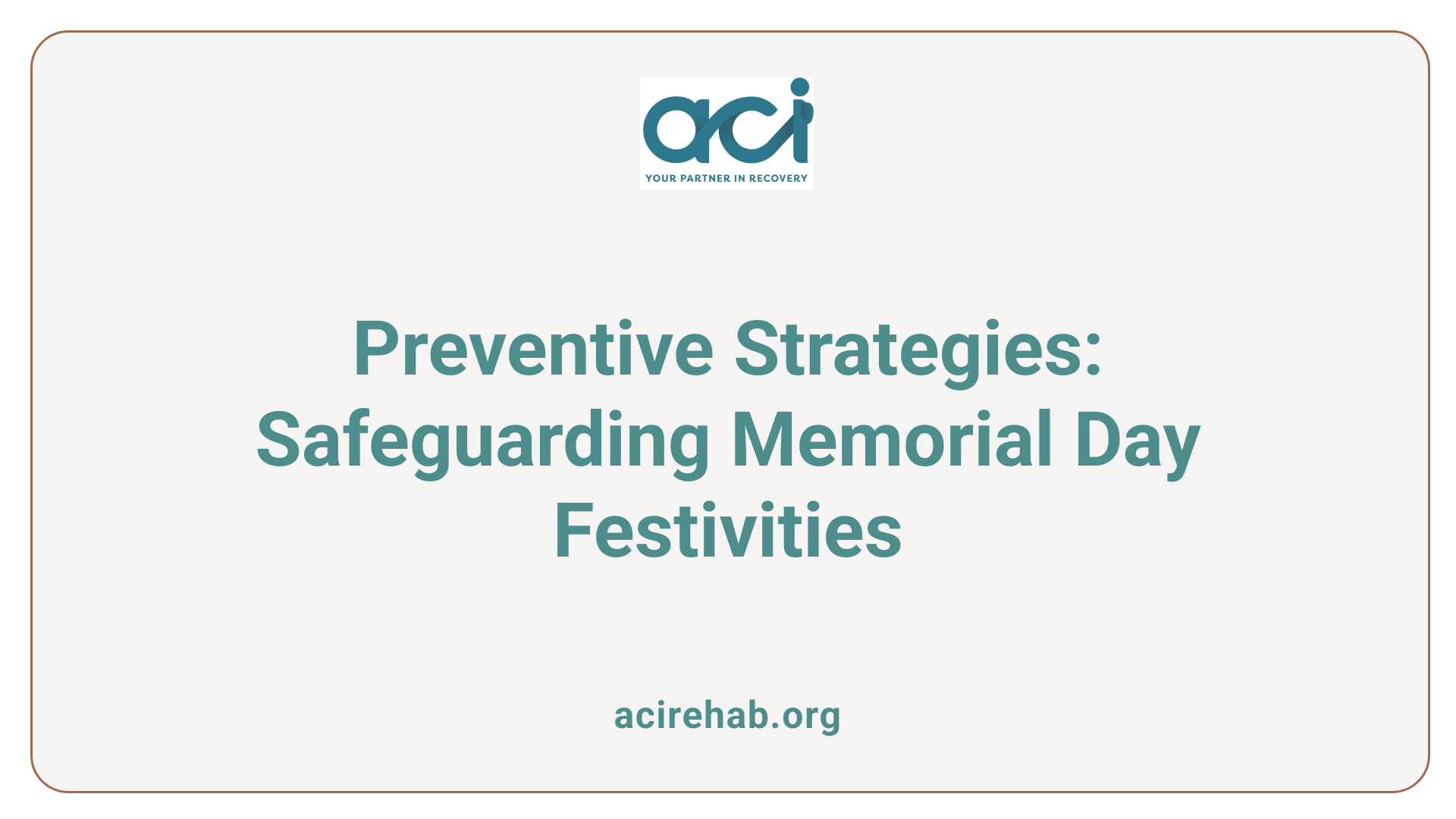
What are some effective preventative measures for avoiding substance use on Memorial Day?
Combating substance use during Memorial Day requires proactive strategies. One effective measure involves planning for safe transportation. This can decrease the temptation to drive under the influence, significantly reducing the risk of accidents.
Setting personal alcohol limits is crucial for managing consumption. By establishing boundaries beforehand, individuals can help maintain control over their drinking, lessening the likelihood of overindulgence.
Engaging in alternative activities such as outdoor games, family barbecues, or community events can orient focus away from alcohol. Fostering a fun atmosphere without the emphasis on drinking not only promotes sobriety but also facilitates enjoyable interactions without substance use.
Education on risks associated with substance use remains essential. Awareness of how substance misuse contributes to various public health issues, including increased emergency room visits or impaired driving fatalities, can motivate individuals to be cautious.
Surrounding oneself with supportive friends who respect personal choices also reinforces decisions to abstain from alcohol or drugs. This network can provide encouragement and help create a celebratory environment that is safe and enjoyable for everyone.
By implementing these strategies, communities and individuals alike can work toward safer Memorial Day celebrations that focus on joy rather than substance use.
Safety Concerns: Alcohol’s Impact on Recreational Activities
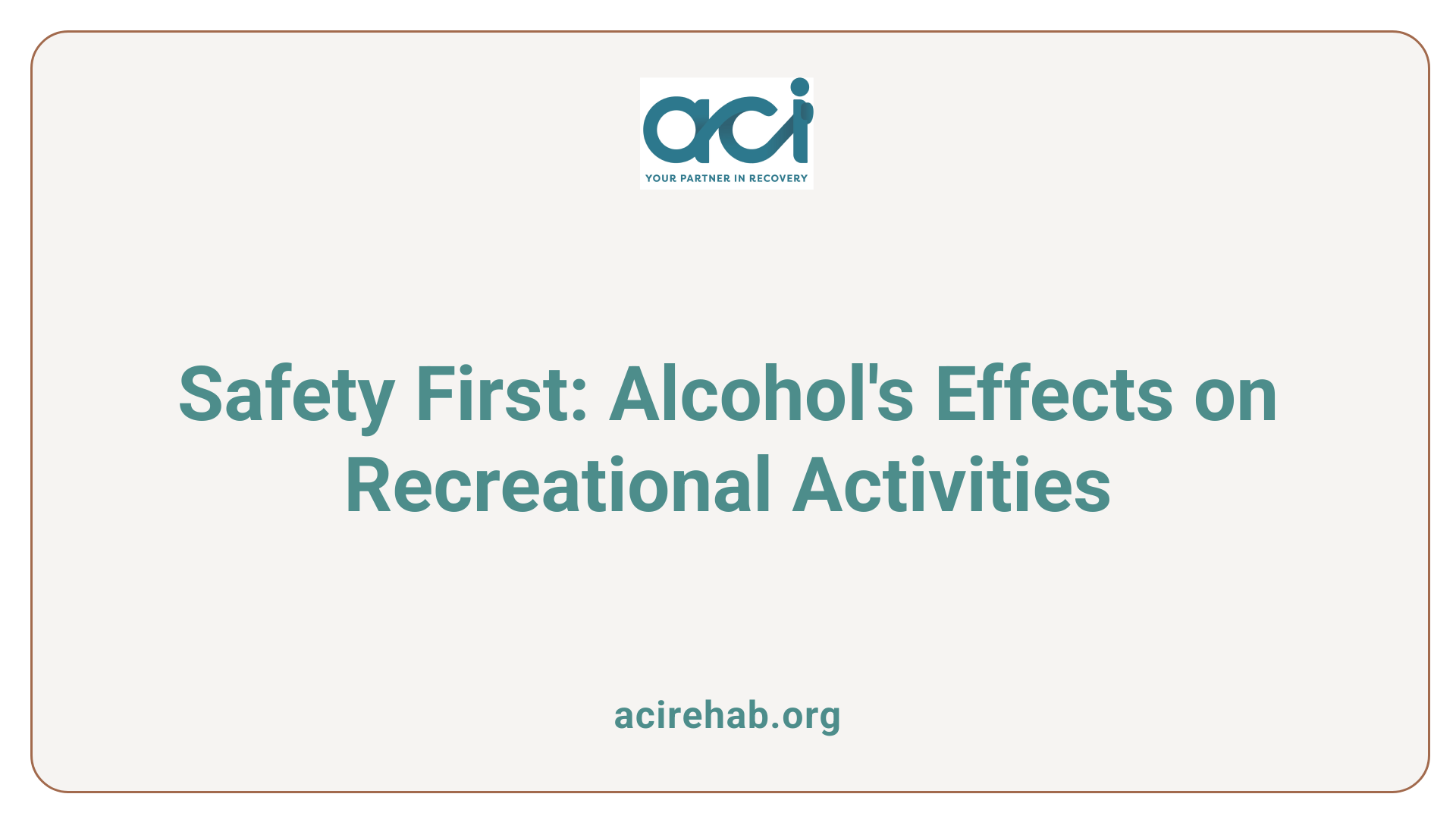
What are the safety tips and effects of alcohol on activities like boating and swimming during Memorial Day?
Memorial Day weekend often marks the unofficial start of summer, leading many to engage in recreational activities such as boating and swimming. However, it’s crucial to acknowledge the serious risks associated with alcohol use in these contexts. Alcohol consumption can impair judgment, decrease coordination, and significantly raise the likelihood of accidents, including drowning.
To enhance safety during these activities, consider the following strategies:
- Avoid alcohol before and during water activities: Consuming alcohol can greatly impair your ability to react swiftly in emergencies.
- Use life jackets: All individuals, especially children, should wear properly fitted life jackets when on a boat or near water.
- Assess the environment: Be aware of potential hazards such as weather conditions or strong currents, which can become more dangerous under the influence of alcohol.
- Designate a sober supervisor: Having someone who remains sober can help oversee activities and ensure all participants are safe and making responsible choices.
By incorporating these strategies, you can help minimize risks and ensure a safer holiday experience for everyone involved. Remember that safety should always come first, especially during celebrations that combine fun with potentially hazardous activities.
Challenges for Individuals in Recovery During Memorial Day
What challenges do individuals in recovery face during holiday gatherings like Memorial Day?
Individuals in recovery encounter several significant challenges during holiday gatherings like Memorial Day. The influence of peer pressure can be considerable, especially when friends and family encourage drinking or casual substance use. Familiar phrases like, "One drink won’t hurt you," can pose serious temptations, leading to heightened risk of relapse.
Moreover, holiday events often serve as emotional triggers. For many in recovery, just being in an environment where alcohol and drugs are present might spur feelings associated with past usage or induce cravings. Such social situations can amplify feelings of anxiety or depression, which are common among those battling addiction.
What role do triggers play in maintaining sobriety during Memorial Day?
During celebrations, individuals in recovery might experience several mental and emotional triggers that challenge their resolve. The festivities are often linked to cravings due to the societal normalization of alcohol consumption. This can be particularly hard for those who have recently found sobriety, making planning essential.
What support mechanisms are effective during this time?
Building a reliable support network is crucial. Engaging with fellow individuals in recovery or sober support groups can provide motivation during gatherings. It’s also helpful to have backup plans, such as hosting alcohol-free events or bringing non-alcoholic beverages to parties.
Recognizing personal triggers ahead of time allows individuals to prepare and strategize on how to navigate these situations without compromising their sobriety. Therapy programs, like those offered at Harmony Hills, can also provide valuable tools for handling the social pressures of holidays.
Supporting Veterans During Memorial Day
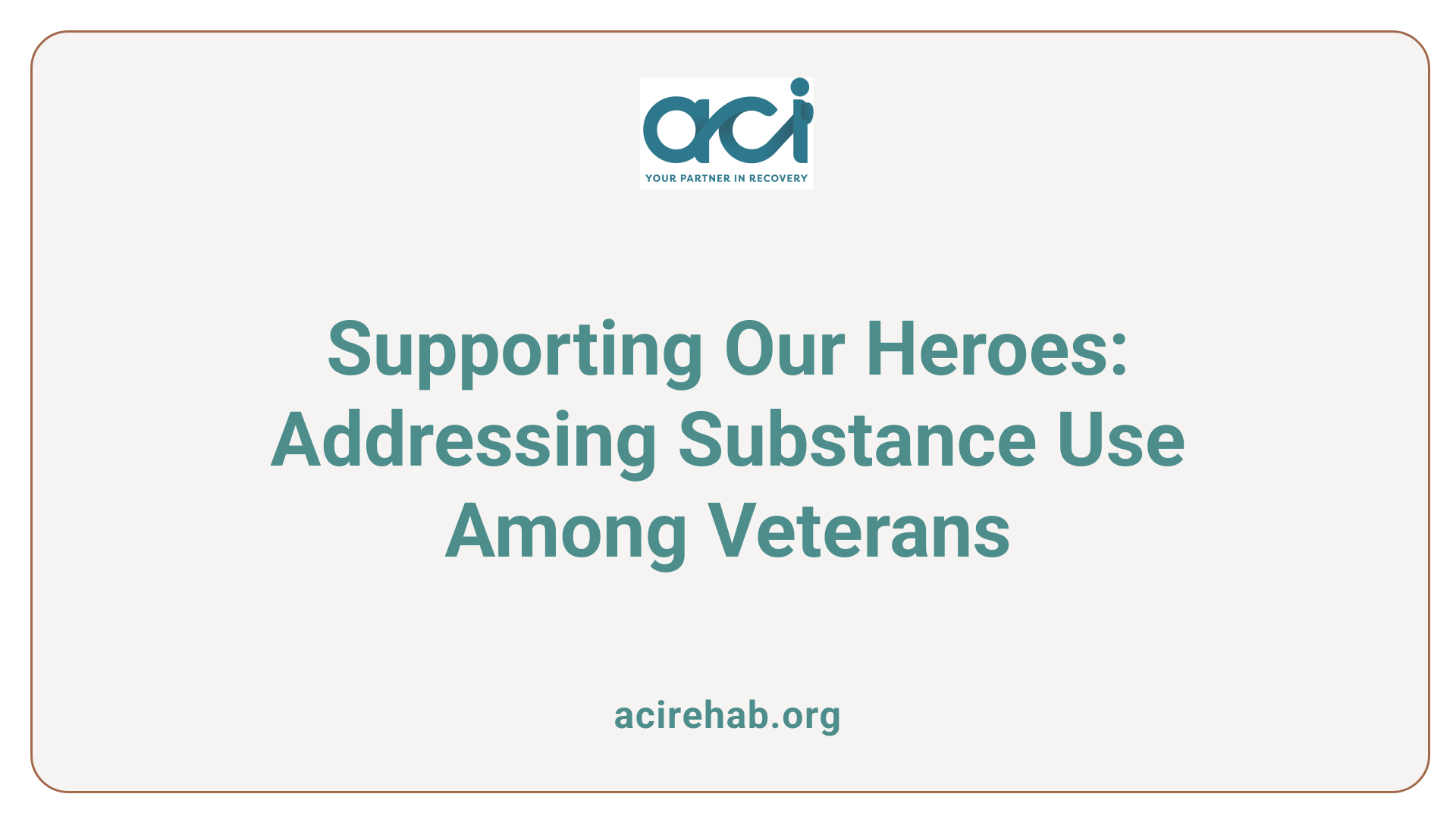
What is the prevalence of substance use disorders among veterans during Memorial Day, and how can we support them?
Memorial Day can be a challenging time for veterans, heralding both emotional stress and the potential for triggers linked to their service experiences. The prevalence of substance use disorders among veterans may see an uptick during this period due to various risk factors, including mental health issues, social influences, and genetic predispositions. These challenges can heighten vulnerability to addiction, making it imperative to provide robust support.
Community initiatives play a vital role in helping veterans cope. Programs offering mental health services can address underlying conditions that might contribute to substance misuse. Peer support groups serve as a critical connection, allowing veterans to share experiences and coping strategies.
Treatment options for veterans struggling with substance abuse
Treatment for substance use disorders among veterans is diverse, integrating several approaches:
- Therapy: Individual and group sessions help address personal struggles and foster resilience.
- Detoxification: Professional supervision during withdrawal can ensure safety and support.
- Medication-Assisted Treatment: This approach stabilizes individuals with medications, reducing cravings and withdrawal symptoms.
Ongoing support is essential in preventing relapse, especially during high-stress times like Memorial Day. Engaging veterans through integrated support systems and maintaining open discussions about substance use risks are essential preventative measures to foster healthier celebrations.
The Pandemic’s Role in Substance Use During Holidays
How has the pandemic impacted substance use during holiday periods like Memorial Day?
The pandemic has had a profound impact on substance use during holiday periods, including Memorial Day. Feelings of isolation and stress have intensified due to extended lockdowns and reduced social interactions, prompting individuals to seek solace in substances.
This reliance on substances has particularly affected certain sectors like food service and construction. Reports indicate that about 17.4% of food service workers and 15.1% of workers in construction struggle with addiction. The pandemic has disrupted regular routines in these industries, leading to increased stress and a lack of coping mechanisms.
Sector-Specific Challenges
Additionally, workers in sectors such as entertainment and media often face unique pressures. These industries have a culture that can normalize substance use, yet awareness about substance abuse may not be as well-documented compared to others. An environment that provides easy access to substances, combined with job-related stressors, has contributed to a rise in substance reliance.
Addressing the Needs for Support
In light of these challenges, organizations and communities must recognize the increased risk of substance abuse during holiday gatherings post-pandemic. This includes providing better access to support systems and interventions. Individuals in recovery from alcohol and substance use disorders may find themselves at heightened risk during celebrations.
Encouraging open discussions and providing resources for coping with holiday stress are crucial steps toward reducing the temptation to misuse substances. Planning safe and sober events, along with engaging support networks, can significantly aid in maintaining sobriety during festive occasions like Memorial Day—particularly in the context of lingering pandemic-related issues.
In summary, addressing the impact of the pandemic on substance use is essential for promoting safety and well-being during holidays and social gatherings.
The 100 Deadliest Days: A Caution for Teen Drivers
Traffic Accidents Spike
Memorial Day weekend marks the unofficial start of summer, leading to increased social gatherings and celebrations. Unfortunately, this also correlates with a spike in traffic accidents. Statistically, traffic fatalities rise by approximately 11% during this holiday, primarily due to intoxicated or impaired drivers.
Underage Drinking Risk
These high-risk days for teen drivers span from Memorial Day to Labor Day, notorious for dangerous driving conditions. With nine out of the ten deadliest days on American highways falling during this period, underage drinking is a major contributing factor. A 2010 SAMHSA study emphasized that emergency room visits for alcohol-related incidents among those under 21 rise by 27% during Memorial Day weekend. This surge highlights the dire impact of combining alcohol consumption with driving.
Safety Initiatives
In response to these alarming trends, various safety initiatives are in place to mitigate risks. High-visibility traffic enforcement strategies, including sobriety checkpoints, have been shown to reduce drunk driving fatalities by 20%. Additionally, campaigns like "Talk. They Hear You." by SAMHSA aim to educate parents and guardians on the importance of discussing the dangers of alcohol and drugs with their teens, fostering a safer environment during these critical months.
| Initiative | Focus Area | Impact |
|---|---|---|
| Sobriety Checkpoints | Reduce drunk driving | 20% reduction in fatalities |
| Talk. They Hear You. Campaign | Parental engagement | Educates about underage drinking |
| Community Safety Programs | Raise awareness | Increases public vigilance |
Community and Parent Involvement as Preventative Tools
Parental Influence
Parents play a crucial role in shaping their children’s attitudes toward alcohol. Early discussions about the dangers of underage drinking can significantly decrease the likelihood of substance abuse. The SAMHSA campaign, "Talk. They Hear You," encourages families to initiate these conversations, helping to cultivate a culture of openness and awareness.
Community Programs
Community initiatives can have a strong impact on reducing underage drinking. Programs aimed at educating the youth and engaging them in positive activities can create supportive environments that deter substance use. Events promoting healthy living can divert attention away from alcohol, especially during high-risk periods like Memorial Day.
Sobriety Checkpoints
Additionally, implementing high-visibility traffic enforcement strategies, including sobriety checkpoints, has shown to reduce drunk driving fatalities significantly. These measures not only discourage impaired driving but also raise awareness about the risks associated with alcohol use during celebrations, reinforcing a collective responsibility for safety and well-being during holidays.
Planning for a Safe and Sober Memorial Day Weekend
Sober Event Planning
To ensure a safe Memorial Day weekend, planning sober activities is crucial. Consider hosting a barbecue or picnic without alcohol, where non-alcoholic drinks can be served. Encourage games and outdoor activities that promote engagement rather than drinking.
Support Network Use
Lean on your support network to navigate social situations. This could include reaching out to friends who respect your decision to stay sober, joining online support groups, or inviting fellow sober individuals to join your activities. Sharing your goals with friends makes it easier to stick to them.
Alternative Celebration Ideas
There are plenty of fun, sober ways to celebrate. Explore options like hiking, visiting local attractions, or organizing a community service day. Engaging in meaningful activities can enhance your holiday experience without the need for alcohol.
| Planning Tip | Description | Benefits |
|---|---|---|
| Host Sober Events | Organize alcohol-free gatherings | Reduces alcohol-related risks |
| Build a Support Network | Connect with friends and groups committed to sobriety | Increases accountability |
| Explore Unique Activities | Engage in outdoor or community service projects | Provides enjoyable, healthier alternatives |
Taking Action for a Safer Memorial Day
In light of the increased risks associated with substance use during Memorial Day, it is imperative for individuals, families, and communities to prioritize safety and prevention strategies. By fostering open communication, engaging in sober activities, and supporting those in recovery and veterans, we can mitigate the negative impacts of this holiday on our societies. Let us honor Memorial Day not only by remembering those who have served but also by committing to safe and responsible celebrations.
References
- Memorial Day is High Risk for Underage Drinking & Drug Abuse
- Memorial Day is a High Risk for Underage Drinking and Drug Abuse
- Staying Sober on Memorial Day Weekend – Rockland Recovery
- Memorial Day is a High Risk for Underage Drinking and Drug Abuse
- Memorial Day Substance Use Risk – HopeBridge Recovery
- Staying Sober on Memorial Day | Alcohol Addiction Treatment
- How to Help Veterans Struggling With Addiction This Memorial Day
- Primed to party: The heightened risk of substance misuse over …
- Addiction and Health | National Institute on Drug Abuse (NIDA)

